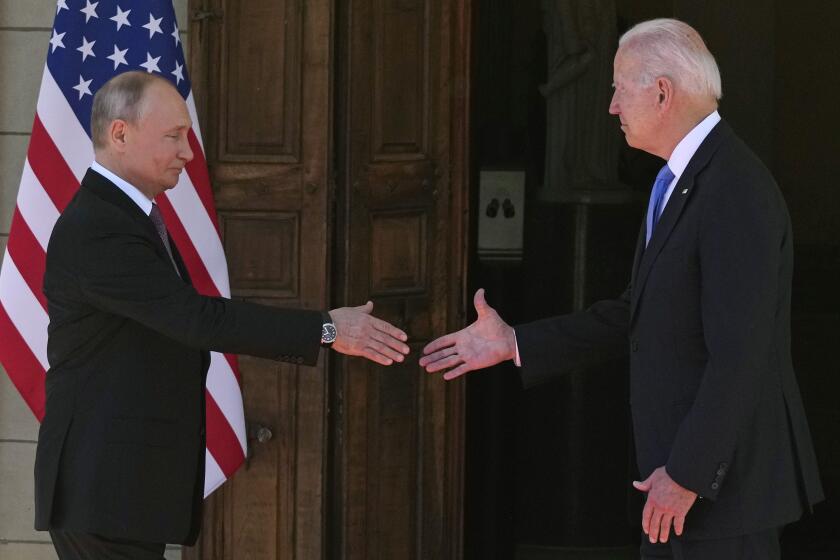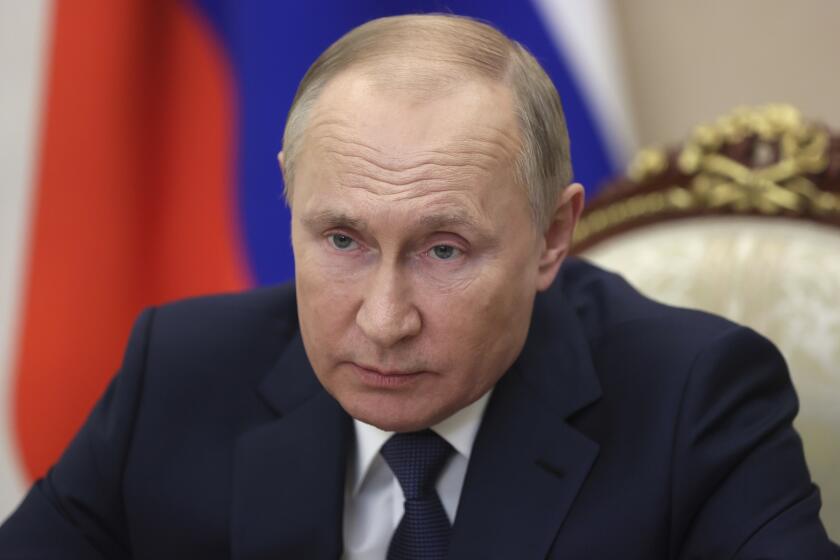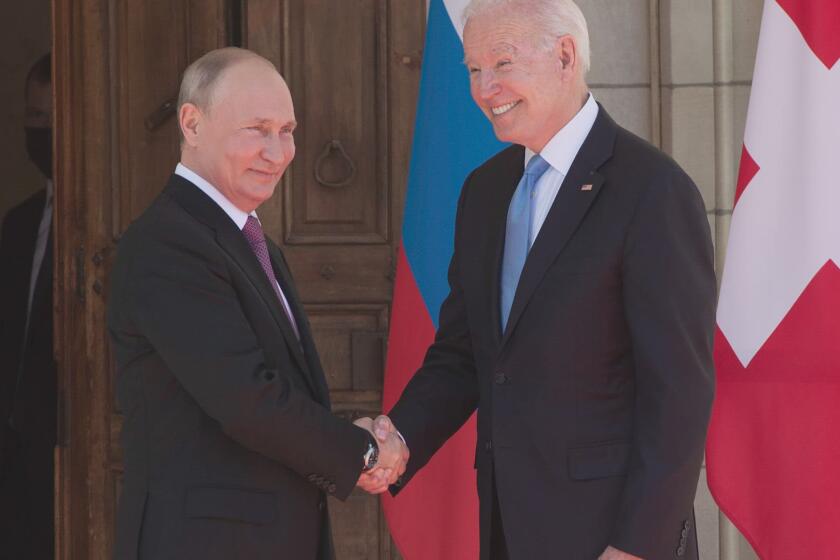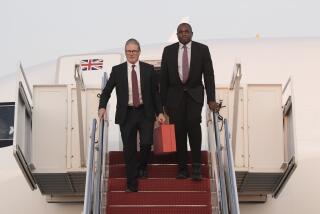Biden to confront Putin about amassing troops on Ukraine’s border
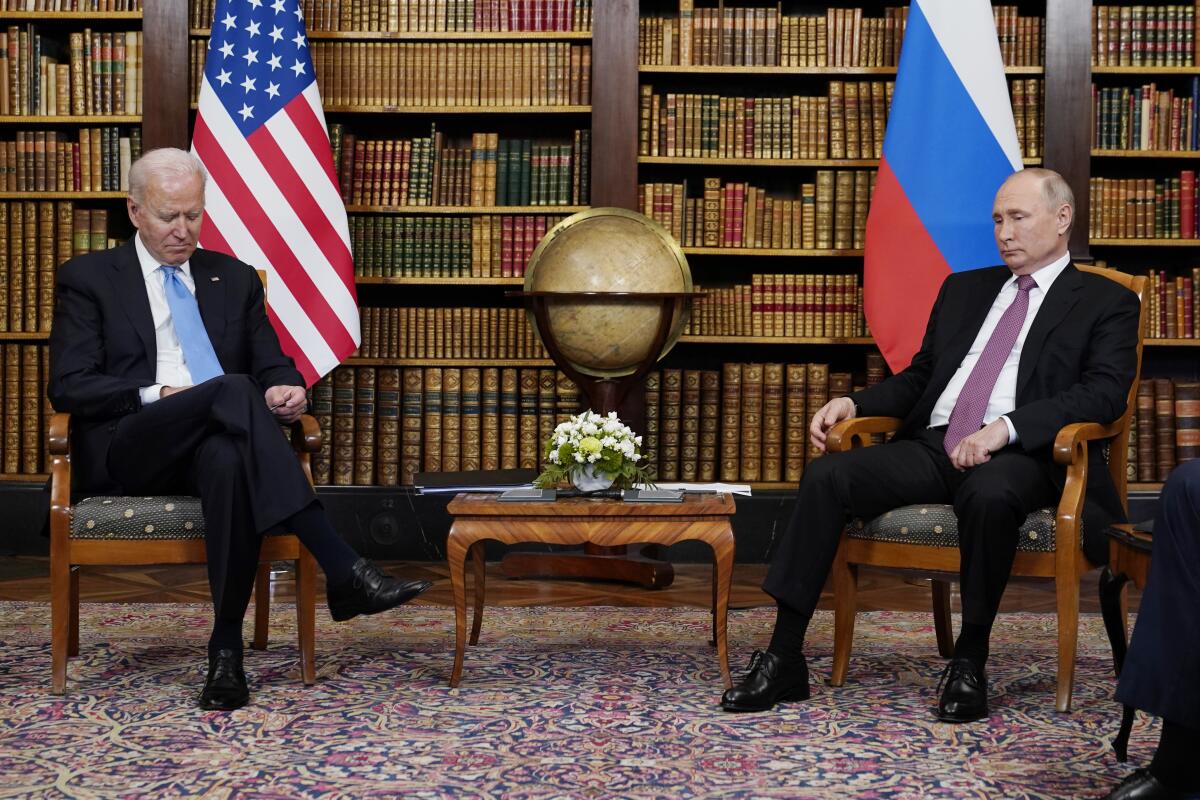
- Share via
WASHINGTON — President Biden expressed cautious optimism after meeting in June with Russian President Vladimir Putin, suggesting the next three to six months would reveal whether their frank face-to-face discussion in Geneva was yielding progress.
“Did the things we agreed to sit down and try to work out, did it work? Do we — are we closer to a major strategic stability talks and progress?” he said at the time.
Nearly six months later as the two leaders prepare to speak again by videoconference Tuesday, cyberattacks from within Russia appear to have slowed, but tensions are rising over Russia’s ongoing buildup of troops along its border with Ukraine.
Biden, who last spoke with Putin in July, will urge the Russian leader to de-escalate the conflict, according to a senior administration official who briefed reporters Monday, speaking on the condition of anonymity because they were not authorized to speak publicly.
“He will make clear that there will be very real costs should Russia choose to proceed, but he will also make clear that there is an effective way forward with respect to diplomacy,” the official said, noting the administration’s familiarity with the “Russian playbook” after its 2014 annexation of Crimea, when Biden was vice president. “They intensified disinformation in an effort to portray Ukraine as the aggressor and use that in an effort to justify what was a pre-planned military attack.”
The official confirmed U.S. intelligence views the mobilization of Russian forces as “consistent with the planning [for] a military escalation, but that “we do not know whether President Putin has made a decision” about following through.
In this case, Putin’s military buildup could be largely about getting the West’s attention. The Kremlin said Friday that Putin would seek binding guarantees from Biden that Ukraine won’t be allowed to join NATO, the transatlantic defense pact under which an attack on any member nation is deemed an attack against all.
Biden, who has sought to reaffirm the U.S. commitment to NATO after President Trump called the alliance “obsolete” and at one point threatened to withdraw, is unlikely to offer Putin those guarantees. In June, he said he conveyed to Putin Washington’s “unwavering commitment to the sovereignty and territorial integrity of Ukraine.” He then underlined the point by welcoming the country’s president, Volodymyr Zelensky, to the White House in August.
President Biden brings up human rights and cyberattacks in meeting with Putin. The Russian leader later rejects blame and accuses the U.S. of abuses.
Biden, however, has not fully endorsed Ukraine’s admittance into NATO and remains hesitant to take on the additional responsibility of guaranteeing the country’s defense. “This is less about Biden personally but about the U.S and the public’s broader unwillingness to serve as global policemen,” said Ian Bremmer, the president of the Eurasia Group, a global risk assessment firm. “There’s a clear lack of interest in paying for an expansion of NATO.”
Biden spoke Monday with key NATO allies to coordinate his message to Putin, according to the senior administration official. Above all, Bremmer said he believes the president “wants diplomacy to continue, and doesn’t want it broken off or to give the Russians any reason to feel their only way to change their situation is by altering the facts on the ground.”
NATO has provoked Putin’s ire by expanding its engagement with Ukraine, amping up military on-the-ground training and aerial exercises around the Black Sea, while providing additional weapons systems from a member country, Turkey, to potentially fend off a Russian onslaught.
Although Bremmer insisted a Russian invasion of Ukraine by uniformed troops is unlikely given the certainty of harsh economic sanctions against Moscow as a result, he said Putin could escalate the conflict in other, more subtle ways through cyberattacks or hybrid warfare.
“The Kremlin is highly incentivized to create ambiguity about what exactly they are doing,” Bremmer said. “It’s not at all clear how the Americans would respond to [hybrid warfare or armed conflict involving insurgents backed by Moscow]. The more Biden is able to spell that out in this phone call, the better.”
The Kremlin says President Biden and Russian President Vladimir Putin will hold a video call Tuesday
Ben Hodges, a retired three-star general who previously commanded U.S. Army forces in Europe, said Russia’s military buildup since April makes it impossible to rule out an invasion.
“It’s not inevitable, but all the pieces are in place,” said Hodges, who now holds the Pershing chair in Strategic Studies at the Center for European Policy Analysis.
He said Kremlin rhetoric about Ukraine appears designed to send a message to the West and its own people, to prepare them for military action.
“The language coming from the Kremlin is very specific and very threatening.”
The biggest foreign policy challenge for President Biden is coming not from Asia, but from a more traditional nemesis, Russia’s Vladimir Putin.
The timing of Putin’s pressure campaign makes sense, coming at a moment of enhanced leverage.
Former German Chancellor Angela Merkel, who had been Europe’s longest tenured leader and was the architect of the 2014 Minsk protocol that halted fighting in the Donbas region of Ukraine, just stepped down. And as winter begins, Putin has additional leverage over Europe through the supply of natural gas following the completion of the NordStream 2 pipeline.
“It’s the threat that they would turn it off if the West decides to act very strongly,” Hodges said.
“There will be great reluctance for European nations to do something when they see President Putin has his hand on the gas meter.”
Staff writer Chris Megerian contributed to this report.
More to Read
Get the L.A. Times Politics newsletter
Deeply reported insights into legislation, politics and policy from Sacramento, Washington and beyond. In your inbox three times per week.
You may occasionally receive promotional content from the Los Angeles Times.
